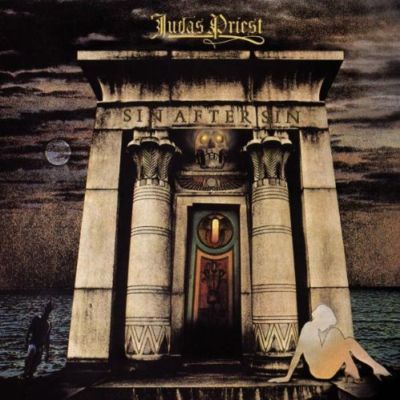Judas Priest III: Monumental and Ahead of its Time - 87%
This record is often overlooked, primarily due to it being stuck between two fan-favourites that were much more popular at release and still are today. However, this is one of Priest's undisputed best, because it captures the best of not two, but three worlds. There are obscenely heavy sections on Sin After Sin, especially for 1977, while there are classic speed metal songs and also a few ballads. The variety on the album doesn't make it inconsistent however; from the opener Sinner we get a mixture of all 3 styles. This has to be a top 5 Judas Priest song, and hearing them play it live as a surprise track last month was a dream come true. Obviously a bluesy, pioneering heavy metal riff dominates the first half of the track, but then it twists into a more progressive atmosphere halfway through, with an epic lead and some of Halford's best guitar work. This nearly 7 minute monster of a song isn't hindered by its length, but instead capitalises on the changing sections to make a truly memorable opener.
Sin After Sin in its entirety is mostly progressive too. Although it's not as close to perfection as Sad Wings or Stained Class, such a great run of tracks is presented here, all with strong memorable cohesion within the band and, above all, barrages of crushing riffs. Starbreaker is an odd song with the hand-clapping in the chorus that comes off as corny, but I would be lying if I said the song wasn't great; it's more upbeat and less focused on atmosphere, but there's infections grooves all over the place and the guitar tone resembles the charm of classic Priest. On the topic of production, this is pretty much identical to Sad Wings, albeit more condensed into a less epic classic rock sound.
With that being said, the lead playing shines all over this album. Race With The Devil namely is a bonus track, but it encapsulates an element of jamming without becoming too wanky. The song structures still aren't flawless, with some areas of the record sounding phoned in, like Let Us Prey which sounds like a rejected intro/outro for A Night At The Opera, although this pays off with the epic Call For The Priest. That track keeps the melody prominent, but also showcases some of the blistering speeds Judas Priest was capable of, showing that they were ahead of their time.
Now, there's definitely some fat that could be trimmed from the album. Last Rose of Summer is a lame ballad that fails to go anywhere and doesn't justify its 6 minute length, with some attempts at a psychedelic sound and an uncomfortably low vocal register, highlighting that the band had all the wrong ideas at this point in the record. I understand that in the 70s, at least half of all music had to be a down-tempo, directionless pile, but this just doesn't fit on an album that is constantly energetic, whether it's slow or fast. Also, the decent guitar licks don't outshine the pointless lyrics and contrived chord progressions that drone on and on. Don't get me wrong, there are some great ballads on Sin After Sin. Diamonds and Rust is somehow explosive and deeply emotional at the same time and it never gets old. The way they adapted this cover into powerful, layered guitars perfectly fits the album. It also illustrates that Rob Halford is still at his absolute peak; he doesn't reach insane high notes like on the last album and keeps it more balanced.
So, the review is almost over and I haven't addressed the elephant in the room here; the main talking point of Sin After Sin for most fans with good reason. Dissident Aggressor is a powerhouse of a track, it's stupidly heavy, short but ridiculously dynamic and endlessly relistenable. If the Roman Empire had a theme song, it would be Dissident Aggressor. Between the nonsense lyrics, a flying guitar solo and two of the best riffs in music, this metalhead anthem represents everything good about Judas Priest in less than 3 minutes. Arguably the first thrash metal song is enough of a reason for you to listen to Sin After Sin on its own, but it flawlessly wraps up a brilliant album with only a handful of weak points. It's an ambitious but consistent record, and is exceptional in executing ideas that influenced endless bands in the following decade. I wouldn't call this a turning point in the discography, but it's an essential listen.

